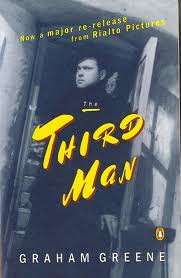Greene, Graham (1950). The Third Man. New York: Viking.
The theme music on zither is prominent and memorable in the mid-century film starring Joseph Cotten and Orson Welles. This novella was a treatment for that movie, generally regarded as a classic. Take the book out from the shadow or the halo of the movie and you have a slightly above average mystery set in occupied Vienna at the end of WWII.
Rollo Martins, a well-known writer of American Westerns, has been summoned to Vienna by his dear old friend and schoolmate, Harry Lime. He arrives just in time for Harry’s funeral. He learns that Harry was killed in an accident when he stepped out in front of a truck. Witnesses say two men carried him from the street, dead. However, for reasons that were not clear, Martins believes it could not have been an accident, and begins sleuthing about Vienna looking for foul play. Eventually he interviews a man who saw the whole thing from his apartment window and claims there was a third man at the scene. Martins tries to discover the identity of this alleged third man, but the witness is murdered before he can talk to him again.
The plot is serviceable, though as mysteries go, there isn’t much at stake until very late in the story when we learn Lime might have been a racketeer, but even then, black-market racketeering was routine in post-war Vienna, as the police chief says. We discover that Lime was worse than a heartless profiteer, an amoral villain selling watered down or adulterated penicillin. In a memorable speech, Lime defends himself by noting that so many millions died pointlessly in the war, it makes no difference if a few more anonymous lives are counted as well, in order to make him wealthy. The final chase through the sewers is perhaps a metaphor for how human life had been so devalued by the end of the war.
The writing is interesting, especially having the main narrator be not Martins, but the British police captain. Nevertheless Greene alternates among first-person reporting, second person addresses to the reader, and omniscient third person narration, creating some problems in following the story, but mainly it was jarring because we just don’t write that way anymore today. The voice seemed archaic.
There are some wonderful images and turns of phrase. My favorite was “a silence deeper than absence.” The dark, gritty, mysterious and dangerous atmosphere of postwar Vienna is well-described, although specific settings are less detailed, such as bars, cars, and hotel rooms. The characters are under-motivated but generally interesting and not stereotypes. There is some mild humor, hardly to be mentioned. See the movie, skip the book.

